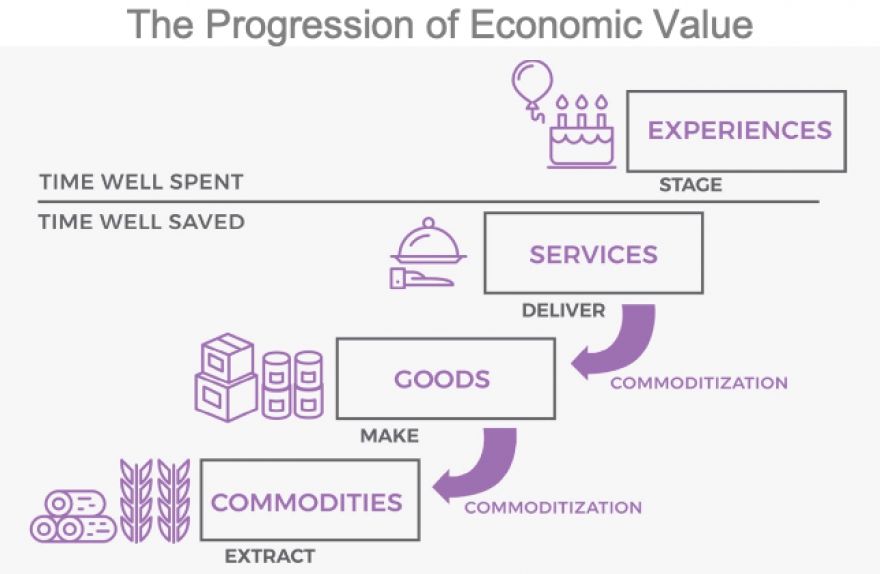
Vol. XXII, No. 12, December 2022
- Editor's corner
- The role of alcohol at location-based entertainment
- Dave & Buster's Q3 2022 results
- Death by a thousand cuts
- Should location-based entertainment prioritize sustainability?
- What do people find meaningful and fulfilling?
- Why the birth rate is declining
- Two different eatertainment venues
- Why market and financial feasibility studies need to be different today
- Time saved, or time well spent?
- Older Gen Z trending vegetarian, vegan, and flexitarian
Time saved, or time well spent?
In one of his white papers, Joe Pine, co-author of the Experience Economy book, discussed how time is the key distinction between services and experiences in the Progression of Economic Value. Joe says, "Services are about time well saved while experiences are about time well spent. To stage a true distinctive experience, you have to get customers to value the time they spend with you."

From:
It's The Experience Economy, Stupid...
by B. Joseph Pine II
As we've discussed in many of our past articles, the decision to leave home and visit a particular leisure venue is more about using discretionary leisure time than spending discretionary money. In our time-pressed culture, the last thing people want to do is waste their leisure time. For that reason, we see a trend of people choosing premium, higher fidelity, meaningful experiences when they do go out, even if they cost a premium in price, to make sure it is worth their time. For higher socioeconomic consumers, who are the vast majority of the out-of-home leisure/entertainment venue market and are the most time-stressed, their time is more valuable than their money. Better to part with more money to be assured of gaining the maximum value and enjoyment for, as Joe says, "time well spent."
Bompas & Parr, in a report on the future of public leisure and the shape it's likely to take in our post-pandemic world, describe time as "the new marker of luxury and a precious commodity to be spent wisely... Time is becoming a luxury as we try to cram as much into our everyday lives as possible," they say.
The value of time well spent has taken on a new measure. People have missed the social aspect of being in person during the pandemic. After being physically apart during the pandemic, people crave more meaningful in-person, social bonding experiences.
Too many operators in the location-based leisure industry, including the many types of community-based entertainment venues and family entertainment centers (FECs), believe price is the best way to be competitive. Focusing on price means they don't understand the basic consumer value equation for visiting. It's about the value of the experience - will it be time well spent considering how little time people feel they have to invest and how many options they have? If it is time well spent, consumers will gladly pay a fair price. As Joe Pine says, "Experiences that engage and fascinate, absorb and immerse, and leave lasting memories" drive demand.
Additional reading
Vol. XXII, No. 12, December 2022
- Editor's corner
- The role of alcohol at location-based entertainment
- Dave & Buster's Q3 2022 results
- Death by a thousand cuts
- Should location-based entertainment prioritize sustainability?
- What do people find meaningful and fulfilling?
- Why the birth rate is declining
- Two different eatertainment venues
- Why market and financial feasibility studies need to be different today
- Time saved, or time well spent?
- Older Gen Z trending vegetarian, vegan, and flexitarian


